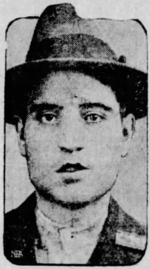 The Central New Jersey Home News, May 22, 1926. Convicted and sentenced to life in prison in Essex County, New Jersey, in 1918, Raffaelo Morello was released eight years later when it was learned that his alleged confession was a misinterpretation of his translated words. A short time after immigrating to the United States, Raffaelo Morello received a letter at his Newark home ordering him to report for the draft. His seventeen-year-old wife of four months, Annette, threatened to commit suicide if he left for the Army. He told her that he could not look his fellow workers in the face if he did not go. He told her that he had to go because his country had called. In early 1918, on the eve of Morello’s expected departure, two pistol shots were heard from the couple’s room. Police found Annette Morello dead from a gunshot wound to the head. Her husband was lying unconscious and wounded beside her. He was charged with murder and attempted suicide. Morello, who could not speak or understand English, gave his statement at the coroner’s inquest through an interpreter. The interpreter, Joseph Frederici, was unfamiliar with the Italian dialect spoken by Morello. According to Frederici, Morello supposedly admitted his guilt, and Morello was later found guilty by a jury. The jury recommended that mercy be shown, and on April 27, 1918, Essex County Judge Martin sentenced Morello to life in prison rather than death. Two years later, having learned to speak English in jail, Morello explained the story to his friends, who hired attorney Harold Simandi. Morello explained that his wife had committed suicide. Overcome with grief, Morello had attempted suicide but had only wounded himself. What Morello had intended to say at the coroner’s inquest was that it was his insistence that he go to war that was responsible for his wife’s death. This was misunderstood as a confession to murder. Frederici later admitted that Morello’s statements were consistent with two interpretations: either “she wanted it done” or “she did it.” Morello was granted parole in May 1926 based on his innocence. Upon his release from prison, he was arrested by federal authorities seeking to deport him for being an undesirable alien. He was released on bail pending the decision of the Court of Pardons. Governor A. Harry Moore granted Morello a pardon on June 23, 1926, which resolved his status as an undesirable alien. – Researched by David Nordsieck
|